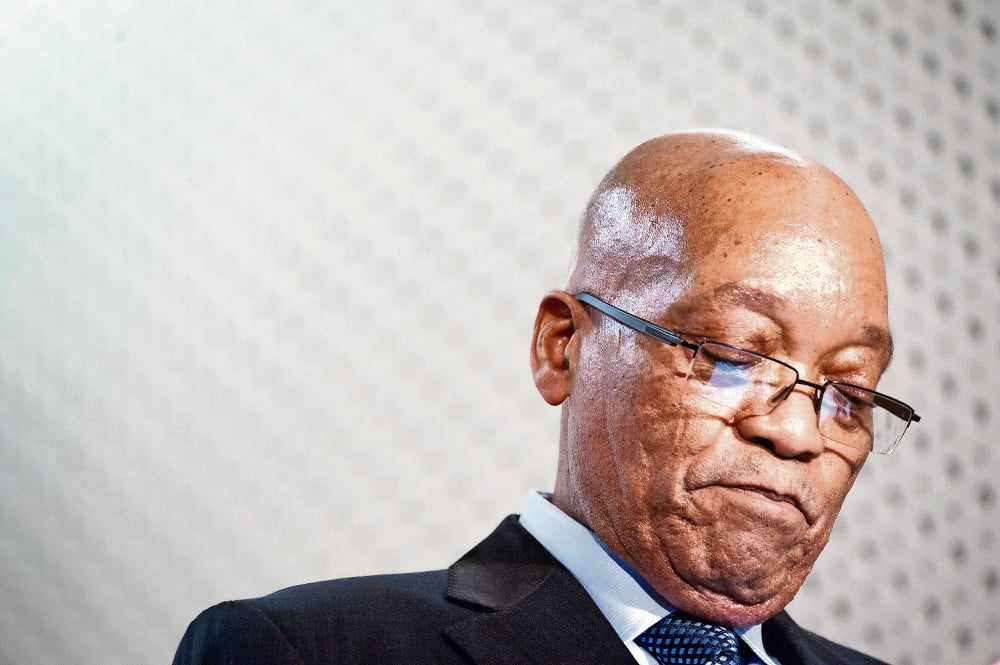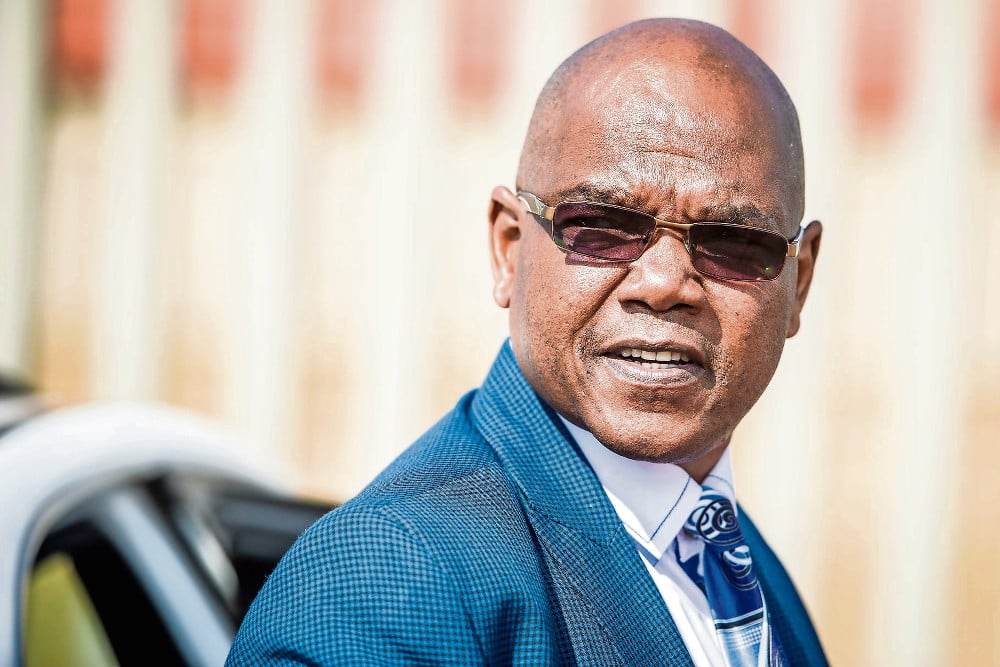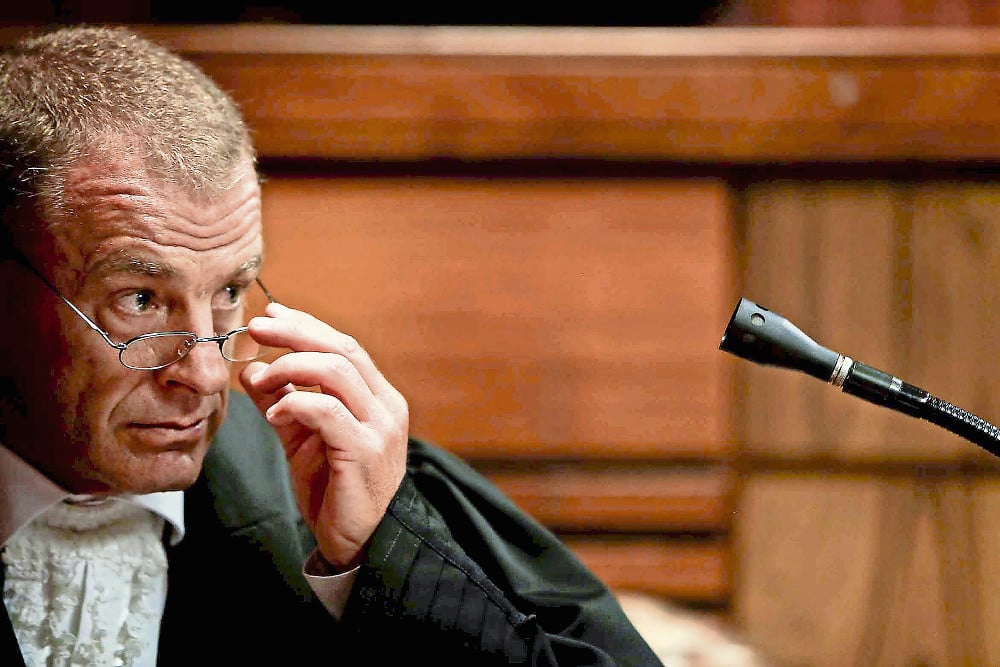The new director of the NPA
Advocate Nomgcobo Jiba this week cemented her position as one of the most powerful people in the National Prosecuting Authority (NPA) – even, some critics argue, emerging as its de facto boss.
Shaun Abrahams, the 39-year-old prosecutor appointed by Jacob Zuma to succeed Mxolisi Nxasana as the national director of public prosecutions (NDPP), on Tuesday announced the withdrawal of perjury charges against her and a “reshuffle” of the NPA executive.
Related:
Although he refused to be drawn on the details, the NPA has not denied reports that Jiba has been appointed to lead a new division combining the National Prosecution Service and the National Specialised Prosecutions Service, which includes powerful agencies such as the Commercial Crime Unit.
This came despite a pending bid by the General Council of the Bar (GCB) to have her struck off the roll of advocates, a move that, if successful, would disqualify her from her current position.
Abrahams’s brazen action to bolster her power base also flies in the face of a court application by the nongovernmental organisations Corruption Watch and Freedom Under Law that seek to set aside the removal of Nxasana and declare Abrahams’s appointment invalid.
His announcements have prompted renewed allegations of the political capture of crucial state institutions that are supposed to act independently.

Many of the allegations of wrongdoing involving Nomgcobo Jiba go back to President Jacob Zuma. (Madelene Cronje, M&G)
Corruption Watch’s director, David Lewis, told amaBhungane the decision tantamount to promoting her “cannot possibly be reasonably sustained”.
“It’s time to be really worried about the NPA,” Lewis said. “If you are a South African who is concerned about corruption and crime, you need to be really, really worried.”
He said the question that emerged was: “What is it that ties the political decision-makers to this small group of people in the NPA that have undermined the independence of the organisation for years now – and in the most extraordinary turnaround have just been confirmed in power now? Is it the politically powerful who protect them, or is it they who have some hold over the political principals and can demand protection?”
Jiba this week declared that “I don’t work for President Zuma”, and denied she acted partially.
But she has been accused of misconduct in many incidents and cases that appear to be tied to Zuma’s political interests.
They go as far back as crime intelligence boss Richard Mdluli’s 2008 investigation of Jiba’s bête noire, advocate Gerrie Nel, for which Jiba was suspended and charged departmentally for her role in attempting to procure an arrest warrant for Nel.
In 2010, the case was dropped in a deal allegedly brokered by then justice minister Jeff Radebe, regarded as a long-time ally of Jiba.
Zuma appointed her as a deputy NDPP in December of that year.
But the allegations of misconduct flow mainly from her time as acting NDPP, a role she assumed from December 2011, when the Supreme Court of Appeal set aside Zuma’s appointment of Menzi Simelane, until September 2013, when Nxasana took office. They are central to the GCB application to have her struck off the roll of advocates.
The case is based on judicial criticism of her conduct in three matters: the 2012 application by Freedom Under Law to challenge the decisions to withdraw separate murder and corruption charges against Mdluli, a self-declared Zuma loyalist; the 2013 Democratic Alliance case to access the so-called NPA spy tapes to buttress their attempt to have corruption charges against Zuma reinstated; and the 2012 challenge by the KwaZulu-Natal Hawks commander, General Johan Booysen, to Jiba’s authorisation of racketeering charges against him.

The re-enlrolment of corruption charges against the former crime intelligence boss, Richard Mdluli, is pending. (Cornel van Heerden, Gallo)
Booysen was charged in connection with the so-called Cato Manor hit squad, but it is widely believed that the real reason for targeting him was his involvement in investigations of crime intelligence and of Thoshan Panday, a Durban businessperson associated with members of the Zuma family.
Added to that was Booysen’s closeness to Bheki Cele, the former police national commissioner and a powerful player in the anti-Zuma faction in KwaZulu-Natal.
It was the hit-squad case that gave rise to the perjury charges against Jiba that Abrahams announced had been withdrawn, allegedly because there was no prospect of success.
The only reason so far advanced for this view is that the Prevention of Organised Crime Act, under which Booysen was charged, indemnifies actions taken “in good faith”.
But this hardly explains the withdrawal of charges, given that the basis for the case was that Jiba had intentionally misled the high court in Durban about the evidence she had before her that supported the racketeering charge laid against Booysen.
In that case, Booysen contended that none of the evidence before her at the time implicated him in terms of the Act. Judge Trevor Gorven concurred.
Booysen submitted that Jiba had lied in her sworn statement. She was invited to explain how she could have taken into account information that objectively did not exist at the time of taking the decision.
Gorven noted: “In response to Mr Booysen’s assertion of mendacity on her part, there is a deafening silence. In such circumstances, the court is entitled to draw an inference adverse to the NDPP.”
At a press conference on Wednesday to mark what she called the “NPA coming to its senses” by withdrawing the charges, Jiba attempted to suggest that the criticism of her by various judges was routine legal disagreement.
But the GCB argues that the case against Jiba boils down to repeated instances of dishonesty, including in the Booysen case, which render her unfit to be an advocate.
Johann Kriegler, the retired Constitutional Court judge behind Freedom Under Law, called in to 702 radio on Wednesday to denounce the stated justification for the withdrawal of perjury charges against Jiba.
“A lawyer who lies to the court is unfit to be a lawyer,” he charged.
Kriegler told amaBhungane that Freedom Under Law and Corruption Watch had given Abrahams until Monday to deliver proper reasons.
He said, if they were not satisfied, the organisations would consider launching an urgent application to challenge the quashing of charges.
“I am not sure the public fully understand that a dishonest prosecutor is very much worse than a crooked judge.” He said this was because prosecutorial decisions took place behind closed doors, whereas judges’ rulings were in the open and subject to review.
On the Mdluli matter, the GCB argues that Jiba sought to mislead the court by not placing before it a proper record of all the documents and facts relevant for the court to arrive at a proper decision.
In that case, Judge John Murphy noted: “The conduct of the respondents is unbecoming of persons of such high rank in the public service and, especially worrying in the case of the NDPP, a senior officer of this court with weighty responsibilities in the proper administration of justice.”

The new prosecutions boss, Shaun Abrahams, is said to dislike prosecutor Gerrie Nel. (Sizwer Ndingane, Gallo)
In the DA matter, the appeal court’s Judge Mahomed Navsa tore into what he clearly viewed as Jiba’s obstructionist approach, in which she granted Zuma’s lawyers a virtual veto over granting the DA access to the spy tapes.
Although it is true, as Jiba noted in her press conference, that no judge stated that she was unfit for office, Navsa came close. He said: “This conduct is not worthy of the office of the NDPP. Such conduct undermines the esteem in which the office of the NDPP ought to be held by the citizenry of this country.”
On Wednesday, Jiba delivered a convincing performance of a black woman persecuted by entrenched interests in the media and in the legal fraternity.
She did less well when asked to deal with the matrix of the allegations levelled against her, repeatedly referring journalists to her court papers in the GCB matter.
Her reply to the GCB allegations is substantial – she has invested in good lawyers – but it amounts to a shrewd effort to distance herself from the scene of the crime and blame others for decisions for which she carried ultimate responsibility.?But the GCB is not letting go. In final papers filed this week, it persisted with the argument that many of the positions Jiba took “were not honestly held”. It also strengthened that view with additional material, including disclosing the report of retired Constitutional Court judge Zac Yacoob, who investigated the allegations made against Jiba and others at Nxasana’s request.
In a report not previously published, Yacoob found: “We are convinced, having looked at the dockets, that there was at the very least a prima facie case against Major General Mdluli on the fraud and corruption, as well as the murder and related charges. The fact that they were all withdrawn and that the murder and related charges were not immediately reinstated after the completion of the inquest are both matters of grave concern for all in our country who would rightly insist upon a healthy, effective, nonpartisan and fair prosecution system in South Africa.”
Jiba opted not to co-operate with Yacoob, meaning that he never heard her version and his report could not be conclusive.
Abrahams’s decision to back the Jiba faction – in effect he sidelined the former Asset Forfeiture Unit boss, Willie Hofmeyr, and the former Prosecution Service head, Silas Ramaite – has raised the stakes for a number of cases being pursued both by the NPA and against the organisation.
Aside from the GCB matter, Freedom Under Law and Corruption Watch have served papers asking the courts to declare that the president was conflicted in appointing Abrahams, given the prospect of the DA case and the possibility of corruption allegations being referred back to whoever he appointed as NDPP.
They also argue that the payment of more than R17-million to Nxasana to persuade him to go was improper and illegal, and therefore invalid.
Such a ruling might re-instate Nxasana to his position, though this appears unlikely. As yet, Nxasana has not publicly taken a stand, though if he opted to support Freedom Under Law and Corruption Watch, his input might be highly damaging to Zuma.
Finally, there is a raft of politically sensitive prosecutions that now hang in the balance.
Nel, whom Abrahams is said to dislike, is central to the investigations of Mdluli and Panday. Nel was brought in by Nxasana to review the Panday case after the former Hawks boss, Anwa Dramat, complained about the withdrawal of charges against Panday by Jiba’s protégé, the KwaZulu-Natal director of public prosecutions, Moipone Noko. It is understood he has submitted his findings to Abrahams for a decision.
Abrahams this week denied reports that allegations against Nel were on his radar screen. These relate to the purchase of a CCTV system by the Scorpions, which was then used by members of the South African Revenue Service’s so-called rogue unit to spy on them.
But insiders say Abrahams was the man charged with investigating more troubling allegations of misconduct made against Nel’s team in relation to the Jackie Selebi prosecution, which may yet pose a problem for Nel.
Also pending is the re-enrolment of the corruption case against Mdluli and others relating to abuses of crime intelligence secret funds as well as decisions affecting both sides of the factional divide, including Booysen, Dramat, Robert McBride and, ultimately, Zuma himself.
If Abrahams portrayed himself this week as appropriately hands-off, one insider who knows them both well says Jiba will be very hands-on.
The advocate, who asked not to be identified, said: “Jiba had a lot to do with the appointment of Shaun and she will have let him know: I put you there …
“But at some point Shaun will turn against her. Then we’ll see – she has already done her homework on him.”
* Got a tip-off for us about this story? Email [email protected]

The M&G Centre for Investigative Journalism, a non-profit initiative to develop investigative journalism in the public interest, produced this story. All views are ours. See www.amabhungane.co.za for all our stories, activities and sources of funding.